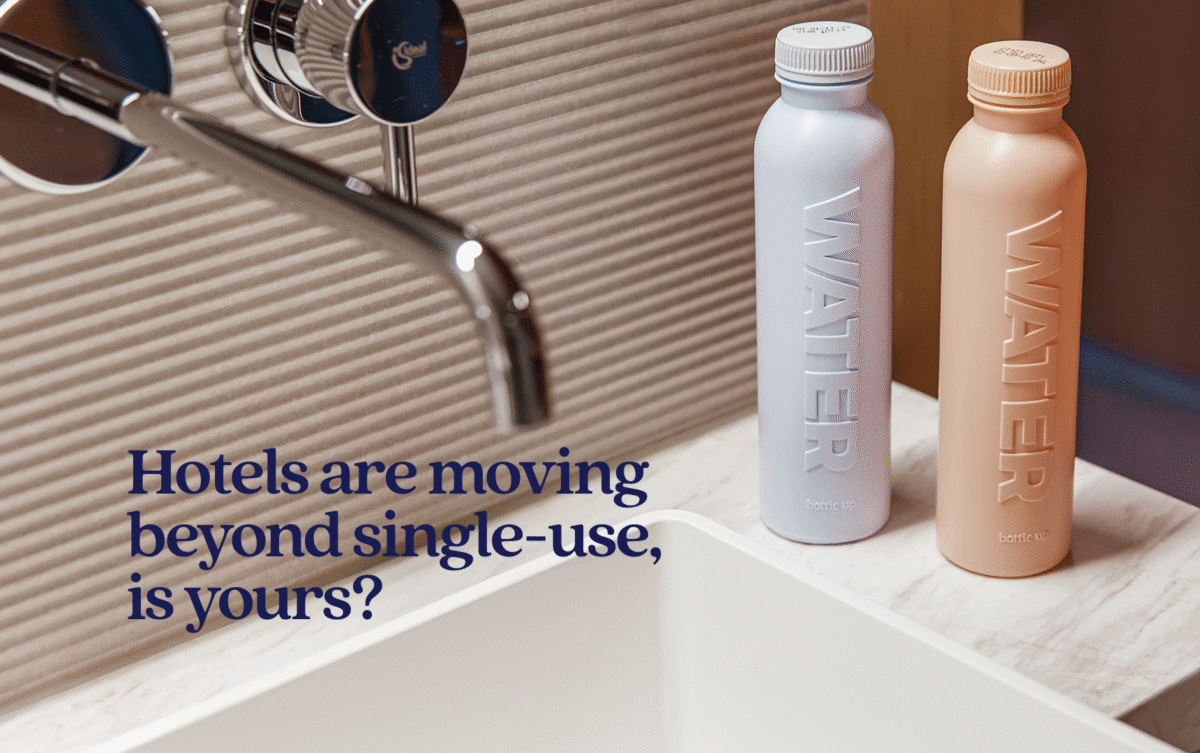Hotels are moving beyond single-use, is yours?

The ongoing journey toward sustainable hospitality
For more than a decade, sustainability has been a central theme in the hospitality industry. Hotels across the globe have pledged to lower their environmental impact, with some joining ambitious carbon-neutrality programs and others publishing detailed sustainability reports. Yet while progress is being made, the path toward a truly sustainable hotel model is complex and layered.
The broader sustainability challenge in hotels
Energy and emissions are among the toughest issues to address. Hotels are energy-intensive by nature: large buildings that run heating, cooling, lighting, kitchens, and laundry facilities around the clock. A single night in a luxury hotel suite can generate more CO₂ emissions than several days at home. Some properties have invested in rooftop solar panels, smart thermostats, or switching to renewable energy suppliers. Others have implemented key-card systems that cut electricity when guests leave their room. These efforts help, but retrofitting older or historic hotels with modern energy-saving infrastructure often proves prohibitively expensive.
Water use represents another critical pressure point. A mid-size hotel can use hundreds of thousands of liters of water each month. Daily towel and linen washing, swimming pools, spas, and landscaped gardens all add up. In regions facing drought, such as Southern Europe or parts of the United States, this consumption creates tension between tourism and local communities. Some hotels now ask guests to opt-in for fresh towels, install low-flow showerheads, or invest in water recycling systems. But behavior change remains a challenge when guests expect luxury.
Food waste is an equally stubborn issue. Buffet breakfasts, all-inclusive dining, and banquet events are convenient for guests but notorious for leftovers. Studies suggest that hotels can waste up to 25% of the food they purchase. Some properties have partnered with food banks or composting initiatives, but health and safety regulations often limit redistribution. Others experiment with technology, like AI-driven inventory systems, to better predict demand. Yet in many cases, trays of uneaten pastries, fruit, and cooked dishes still end up in the bin.
Materials and supply chains also carry hidden environmental costs. From miniature toiletry bottles and plastic-wrapped slippers to imported construction materials during renovations, every product that enters a hotel adds to its footprint. More forward-thinking hotels are phasing out single-use amenities, offering refillable dispensers, and prioritizing local suppliers. Still, global supply chains make it difficult to fully escape reliance on plastics and long-distance transport.
Taken together, these challenges illustrate the complexity of operating sustainably in hospitality. But amid this broad spectrum, one item stands out for its visibility and symbolic weight: the single-use plastic water bottle.
Why single-use water bottles remain a problem
Despite the rise of refill stations and filtered tap systems, many hotels continue to provide single-use bottles in guest rooms. They are convenient, hygienic, and low-cost. Yet their environmental cost is high. Globally, more than 480 billion plastic water bottles are sold each year. Less than half are collected for recycling, and only around 7% become new bottles. The rest are incinerated, landfilled, or leak into the environment, often after being opened only once by a hotel guest.
For hotels that proudly communicate their sustainability credentials, continuing to stock single-use bottles can create a disconnect between message and reality. Guests notice when such an obvious symbol of waste remains unaddressed.
A shift toward reusable alternatives
The solution is deceptively simple: move from single-use to reusable bottles. More and more hotels are experimenting with refillable water stations in lobbies, reusable bottles in rooms, or partnerships with brands that provide sustainable alternatives. For guests, the experience feels premium and modern; for the hotel, the waste stream drops dramatically.
The example of bottle up
bottle up has a proven track record of helping hotels transition away from single-use bottles. Its bottles are made from sugarcane-based bioplastic, pre-filled with still water, and designed for long-term reuse. Guests can use them during their stay and take them home afterward. The benefits are clear:
- Up to 90% reduction in plastic-bottle waste volume
- Positive guest feedback on sustainable design and quality
- Lower logistical burden, as daily restocking of single-use bottles becomes unnecessary
Learn more about this solution on our hospitality page.
A small step with a big signal
In the bigger picture of hotel sustainability, the choice of water bottle may seem like a small detail. But visible, everyday changes are often the ones that resonate most with guests. By replacing single-use plastic with reusable alternatives, hotels can make a clear statement: sustainability is not an abstract commitment, but a practical reality that guests can see, touch, and carry with them long after check-out.
Want to offer your guests a reusable alternative they’ll actually use and keep? Let’s talk.


